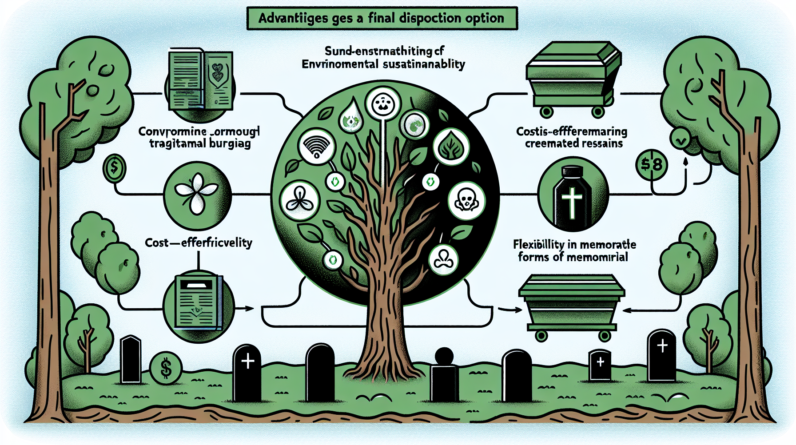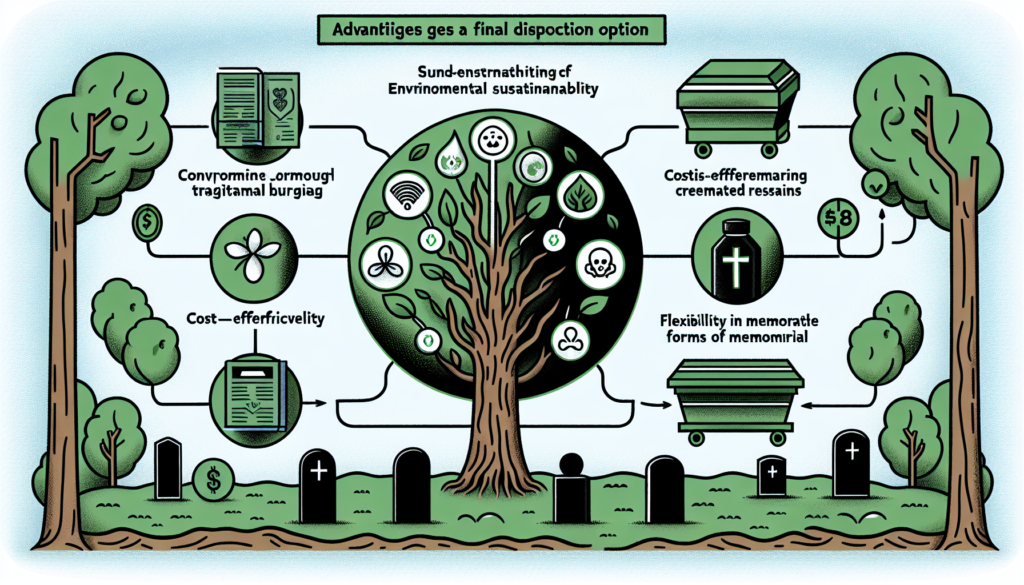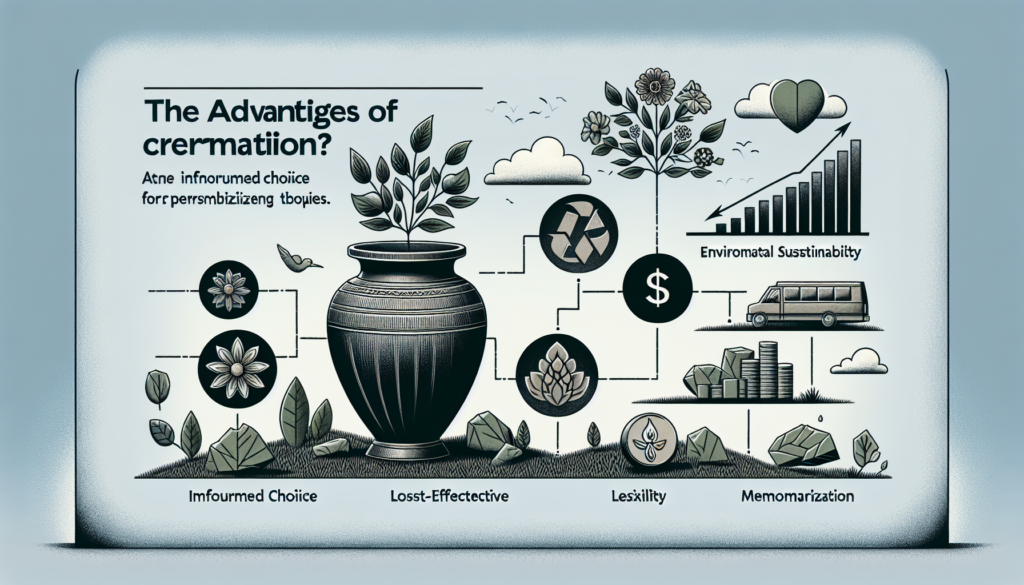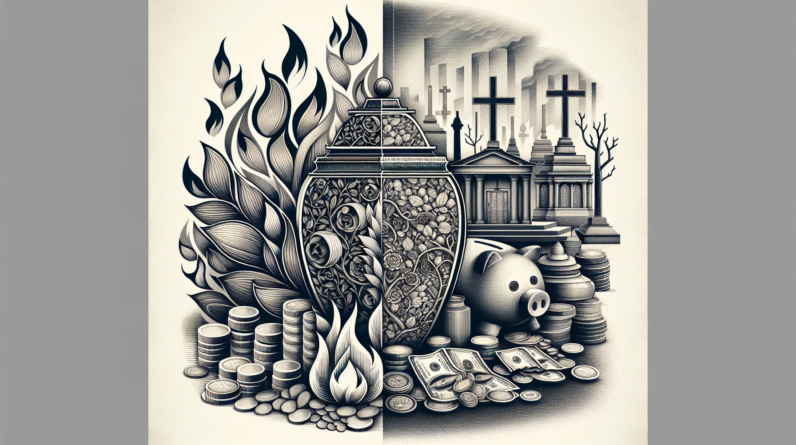
Losing a loved one is never easy, and when it comes to making arrangements for their final farewell, many factors need to be considered. In a bustling city like Houston, where traditions and preferences vary, one option that has been gaining popularity in recent years is cremation. Cremation offers a range of benefits that appeal to individuals and families alike, from its cost-effectiveness to the flexibility it provides in terms of memorialization. Whether it is the eco-friendly nature of cremation or the portable nature of cremated remains, there are numerous advantages that make this method a compelling choice for many in the Houston community.

Environmental Benefits
Reduces land use
Cremation is a more environmentally friendly alternative to traditional burial practices because it reduces the amount of land required for burial plots. In cities like Houston, where land can be limited, this is especially beneficial. Cremation allows for the remains to be stored in a much smaller space, such as an urn or a columbarium niche, minimizing the impact on the environment.
Conserves resources
Cremation also helps in conserving natural resources. Traditional burial involves the use of materials like wood for coffins and concrete for burial vaults, which can deplete these resources. Cremation eliminates the need for these materials, thereby reducing the strain on the environment.
Minimizes water pollution
Another environmental benefit of cremation is the elimination of water pollution. During traditional burial, embalming fluids used to preserve the body can seep into the soil and potentially contaminate nearby water sources. With cremation, there is no need for embalming, reducing the risk of water pollution and protecting the local environment.
Decreases carbon emissions
Cremation produces fewer carbon emissions compared to traditional burial. The process of cremation requires less machinery and transportation, resulting in a smaller carbon footprint. This reduction in carbon emissions is crucial for addressing climate change and promoting sustainable practices in Houston and beyond.
Personal Benefits
Flexibility in memorialization
Cremation provides individuals and their loved ones with more flexibility in memorializing their deceased. Unlike traditional burial, which requires a permanent gravesite, cremated remains can be stored in various ways, such as in an urn, scattered in a meaningful location, or even turned into jewelry or artwork. This flexibility allows for personalization and creativity in the memorialization process.
Portability of remains
Another personal benefit of cremation is the portability of remains. In today’s mobile society, many individuals have family members and loved ones spread across different cities or countries. Cremation allows for the easy transportation of remains, enabling families to keep their loved ones close, even if they are physically far apart.
Ability to scatter ashes
Cremation offers the unique opportunity to scatter the ashes of the deceased in a location that holds special meaning for them or their loved ones. Whether it’s a favorite park, a beautiful beach, or a serene forest, scattering ashes allows for a final connection to nature and a sense of peace for the departed.
Financial Benefits
Lower cost compared to traditional burial
Cremation is typically more cost-effective than traditional burial. In Houston, where the cost of living can be high, this financial benefit is particularly significant. The expenses associated with purchasing a burial plot, a casket, a tombstone, and other cemetery fees can be quite substantial. Cremation eliminates or greatly reduces these costs, making it a more affordable choice for many.
No need for purchasing burial plot or tombstone
One specific financial benefit of cremation is the elimination of the need to purchase a burial plot or a tombstone. These expenses can easily add up and place a significant burden on families during an already difficult time. With cremation, families can opt for alternative memorial options, such as storing the urn in a columbarium or creating a memorial plaque, which are generally more affordable options.

Space-Saving Benefits
Preserves limited cemetery space
With Houston being a bustling city, land availability is at a premium. Cremation helps address this issue by preserving limited cemetery space. The smaller space required for the storage of cremated remains allows for more efficient use of land resources, accommodating a greater number of individuals within a shared space.
Allows for multiple urns in shared space
Cremation also enables the utilization of shared space within a cemetery or memorial garden. Multiple urns can be placed in a designated area, creating a sense of community and allowing families to come together in remembrance of their loved ones. This shared space approach not only optimizes land usage but also fosters a sense of connection and unity among those who have chosen cremation.
Emotional Benefits
Provides closure and peace of mind
Cremation can provide a sense of closure and peace of mind for both the deceased and their loved ones. Knowing that their final wishes will be fulfilled, individuals can find comfort in the knowledge that their remains will be handled according to their desires. For the bereaved, the act of cremation can offer solace and a sense of closure, knowing that their loved one’s physical presence has been respectfully addressed.
Allows involvement in the memorialization process
Choosing cremation allows for active involvement in the memorialization process. Families and loved ones can participate in the selection of an urn, the planning of a memorial service, and the decision on where to scatter or store the ashes. This active role in memorializing their loved one can bring comfort and a sense of personalized tribute, easing the grieving process.
Religious and Cultural Benefits
Acceptance in various religious beliefs
Cremation is widely accepted across various religious beliefs. Many faiths, including Christianity, Hinduism, and Buddhism, recognize cremation as a valid and respectful means of handling the deceased. In Houston, with its diverse population, this acceptance of cremation aligns with the city’s multicultural atmosphere and allows individuals to adhere to their religious beliefs while making a personal choice.
Honoring cultural practices and beliefs
Cremation can also serve as a way to honor cultural practices and beliefs. For example, certain cultures have long-standing traditions of cremation as part of their funeral rituals. By choosing cremation, individuals can pay homage to their cultural heritage and respect the customs passed down through generations.
Convenient Handling of Remains
Simpler transportation and storage
Cremated remains are much easier to transport and store compared to a full casket. The simplicity and reduced weight of an urn make it convenient for families to handle and transport the remains, whether it be for scattering or keeping in a different location. This ease of transportation offers practicality and flexibility for families, particularly those with long-distance relatives.
No need for embalming
Embalming is not required for cremation, which simplifies the handling process of remains. Embalming involves the use of chemicals and preservation techniques, which can be time-consuming and costly. With cremation, embalming is unnecessary, eliminating the need for this additional step and reducing the associated expenses.
Reduced Maintenance
No need for regular grave site maintenance
Cremation eliminates the need for regular grave site maintenance. Traditional burial sites often require upkeep and maintenance, such as mowing, landscaping, and grave marker maintenance. These ongoing tasks can be burdensome for families, both emotionally and financially. Cremation eliminates these responsibilities, allowing families to focus on the memories and honoring their loved ones in a more personal manner.
Does not attract pests or require pesticide use
Unlike traditional burial, cremation does not attract pests or require the use of pesticides. Grave sites can often become a breeding ground for pests, which can damage the surrounding environment and pose health risks. By opting for cremation, individuals can minimize the need for pest control measures and promote a healthier and more sustainable approach to honoring the deceased.
Quick Process
Faster completion compared to burial
Cremation is a quicker process compared to traditional burial. While burial may involve several steps, including embalming, viewing, and graveside services, cremation can be completed within a shorter timeframe. This expeditiousness allows for a more efficient handling of the remains, easing the burden on grieving families and enabling them to focus on the healing process.
Efficient scheduling of memorial services
With cremation, memorial services and ceremonies can be scheduled more efficiently. Traditional burial often requires coordinating various elements, such as availability of gravesites, religious ceremonies, and family schedules. Cremation provides flexibility and allows families to plan and schedule memorial services at a time and location that is most convenient for them, ensuring that everyone can participate and honor the departed.
Flexibility for Family
Easier coordination for long-distance family
Cremation offers increased flexibility and easier coordination for long-distance family members. When loved ones are scattered across different cities or even countries, attending memorial services or visiting grave sites can be challenging. Cremation allows for the distribution of the remains among family members, enabling everyone to have a meaningful connection to their loved one, regardless of their geographical location.
Ability to share cremains or keep in different locations
Cremation provides families with the option to share the cremains or keep them in different locations. Each family member can have a portion of the ashes, allowing for a personal connection and the ability to pay tribute individually. This flexibility ensures that everyone can honor their loved one in their own way and creates a lasting bond among family members, even after the passing of a loved one.
In conclusion, cremation offers a multitude of benefits that extend beyond environmental considerations. From personal, financial, and space-saving advantages to emotional, religious, and cultural significance, cremation provides individuals and their families with a range of options and opportunities for honoring and memorializing their loved ones. As Houston continues to grow and evolve, the adoption of cremation as an alternative to traditional burial aligns with the city’s multicultural atmosphere while promoting resource conservation and sustainability.





